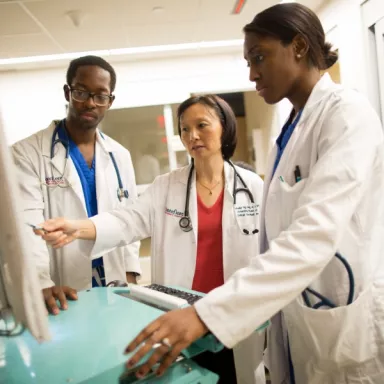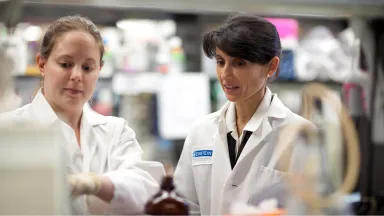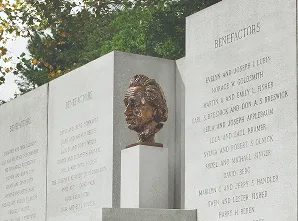
Steven A. Porcelli, M.D.
- Professor, Department of Microbiology & Immunology
- Professor, Department of Medicine (Rheumatology)
- Chair, Department of Microbiology & Immunology
- Murray and Evelyne Weinstock Chair in Microbiology & Immunology
- Scientific Director, Flow Cytometry Core Facility
Area of research
- We study many aspects of T cell immunology and antigen presentation, with a particular interest in protective immunity to Mycobacterium tuberculosis. We also study new approaches to vaccines for viral diseases and immunotherapy of cancer. ,
Phone
Location
- Albert Einstein College of Medicine Jack and Pearl Resnick Campus 1300 Morris Park Avenue Forchheimer Building 416 Bronx, NY 10461
Research Profiles
Professional Interests
Dr. Porcelli's laboratory focuses on the control of acquired immune responses by T cells, which are the master regulatory and key effector cells of host defense and immune tolerance. In broad terms, the research being pursued in the laboratory covers two interrelated areas. The first is to understand the role of regulatory T cells, with particular emphasis on the activities of a specialized T cell subset known as CD1d-restricted NKT cells. These T cells have the highly unusual property of responding to specific glycolipid antigens, which they recognize in combination with a specialized lipid antigen presenting molecule known as CD1d. The laboratory is studying the details of the cellular mechanisms that lead to the uptake and presentation of lipid antigens by CD1d, and is using synthetic lipid antigens recognized by NKT cells to determine how antigen structure controls the immune responses that are generated by NKT cell activation. Methods for using lipid antigens that stimulate NKT cells to treat cancer or improve vaccination are also being studied. The laboratory's second major research area is the study of T cell responses against pathogenic microorganisms, especially Mycobacterium tuberculosis. Work in this area has led to significant progress in understanding how mycobacteria block effective host T cell responses, and this information is now being used to further the design of more effective vaccines for prevention of tuberculosis. A major near term goal of this research is to broaden the understanding of how organisms like M. tuberculosis successfully evade eradication by the immune system. The major long term goal is to create a genetically modified live attenuated M. tuberculosis strain that will be safe and effective as a vaccine against tuberculosis. Another related area of our work uses vaccine strains of mycobacteria to enhance antibody responses against pathogenic viruses including Ebola and SARS-CoV-2 viruses.
Selected Publications
- Porcelli, SA. Tuberculosis: Shrewd survival strategy. Nature 454:702-3 (2008).
- Im JS, Arora P, Bricard G, Molano A, Venkataswamy MM, Baine I, Jerud ES, Goldberg MF, Yu KOA, Ndonye RM, Howell AR, Yuan W, Cresswell P, Chang YT, Illarionov PA, Besra GS and Porcelli SA. Kinetics and cellular site of glycolipid loading control the outcome of Natural Killer T cell activation. Immunity 30:888-98 (2009).
- Venkataswamy MM, Baena A, Goldberg M, Bricard G, Im JS, Besra GS, Chan J, Jacobs Jr. WR and Porcelli SA. Enhancement of immunogenicity of M. bovis BCG by incorporation of NKT cell activating glycolipids. J Immunol. 183:1644-56 (2009).
- Arora P, Baena A, Yu KO, Saini NK, Kharkwal SS, Goldberg MF, Kunnath-Velayudhan S, Carreño LJ, Venkataswamy MM, Kim J, Lazar-Molnar E, Lauvau G, Chang YT, Liu Z, Bittman R, Al-Shamkhani A, Cox LR, Jervis PJ, Veerapen N, Besra GS, Porcelli SA. A single subset of dendritic cells controls the cytokine bias of natural killer T cell responses to diverse glycolipid antigens. Immunity. 40:105-16 (2014).
- Singh M, Quispe-Tintaya W, Chandra D, Jahangir A, Venkataswamy MM, Ng TW, Sharma S, Carreño LJ, Porcelli SA*, Gravekamp C*. Direct incorporation of the NKT cell activator a-galactosylceramide improves efficacy and safety of a recombinant Listeria monocytogenes breast cancer vaccine. (*Joint senior/corresponding author). Br J Cancer. 2014 Nov 11;111(10):1945-54.
- Saini NK, Baena A, Ng TW, Venkataswamy MM, Kennedy SC, Kunnath-Velayudhan S, Carreno L, Xu J, Chan J, Larsen MH, Jacobs Jr. WR, Porcelli SA. Suppression of autophagy and antigen presentation by Mycobacterium tuberculosis PE_PGRS47. Nat Microbiol (9):16133 (2016). PMID: 27562263
- Saavedra-Avila NA, Keshipeddy S, Guberman-Pfeffer MJ, Pérez-Gallegos A, Saini NK, Schäfer C, Carreño LJ, Gascón JA, Porcelli SA, Howell AR. Amide-Linked C4″-Saccharide Modification of KRN7000 Provides Potent Stimulation of Human Invariant NKT Cells and Anti-Tumor Immunity in a Humanized Mouse Model. ACS Chem Biol. 2020 Dec 18;15(12):3176-3186. doi: 10.1021/acschembio.0c00707. Epub 2020 Dec 9. PMID: 33296161
- Ng TW, Wirchnianski AS, Wec AZ, Fels JM, Johndrow CT, Saunders KO, Liao HX, Chan J, Jacobs WR Jr, Chandran K, Porcelli SA. Exploiting Pre-Existing CD4+ T Cell Help from Bacille Calmette-Guérin Vaccination to Improve Antiviral Antibody Responses. J Immunol. 2020 Jul 15;205(2):425-437. doi: 10.4049/jimmunol.2000191. Epub 2020 Jun 8. PMID: 32513849
- Kharkwal SS, Johndrow CT, Veerapen N, Kharkwal H, Saavedra-Avila NA, Carreño LJ, Rothberg S, Zhang J, Garforth SJ, Jervis PJ, Zhang L, Donda A, Besra AK, Cox LR, Almo SC, Howell A, Evans EE, Zauderer M, Besra GS, Porcelli SA. Serial Stimulation of Invariant Natural Killer T Cells with Covalently Stabilized Bispecific T Cell Engagers Generates Anti-Tumor Immunity While Avoiding Anergy. Cancer Res. 2021 Jan 22:canres.2219.2020. doi: 10.1158/0008-5472.CAN-20-2219. Online ahead of print. PMID: 33483371






